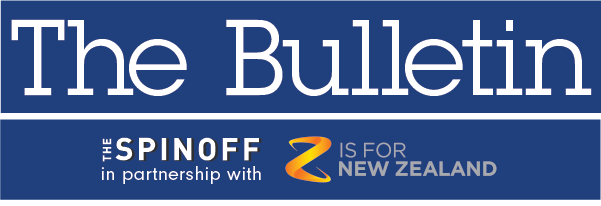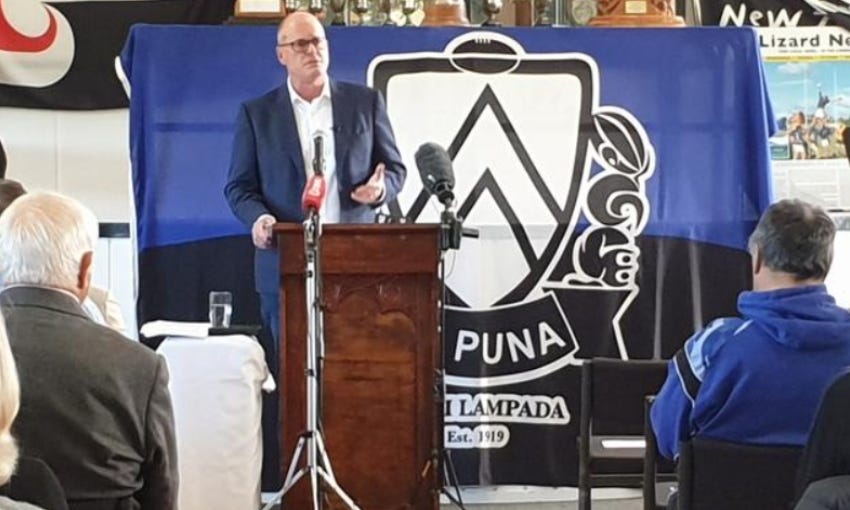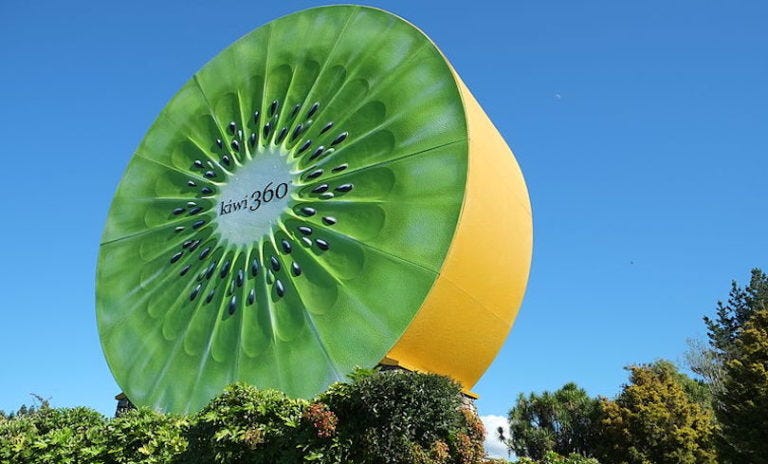Muller makes his pitch for the middle
Todd Muller wants to run as a centrist in the election, but is his party on the same page?

Good morning and welcome to The Bulletin for Monday 15 June, by Alex Braae for The Spinoff. Presented in partnership with Z Energy.
In today’s edition: Todd Muller makes pitch for the middle, further BLM protests take place, and two pieces to illustrate the importance of science in public life.

Image: National leader Todd Muller in Te Puna (Radio NZ, Charlie Dreaver)
The opposition leader gets precious few chances to try and define themselves in the public eye, and Todd Muller has had a bad run here so far. After being in the job just a few weeks following the coup, he has already had his share of blunders and controversies. At a major policy and vision speech in his home town of Te Puna over the weekend, Muller sought to put that right.
The pitch was very much one aimed at the middle of the electorate. Among the commitments, the NZ Herald reports he promised to never either raise taxes or cut benefits if elected, and signalled continued investment in social services and the welfare safety net. It's not exactly stuff that will set the world on fire, and is arguably pretty indistinguishable from the sitting government, but it's good to have on the record all the same. This quote-heavy Newshub piece picks up the theme, with Muller criticising the approach of previous governments in pushing through rapid economic reforms, or failing to address deep-seated societal problems. That included the Key/English government, which Muller was part of. The full text of the speech can be read here.
After the setup, Muller got to his main point – he argued that National will be much better at managing the recovery than the incumbent government. In the pitch, the reason for that was not so much ideological and being based on competency – Muller said that the government had a poor record of delivering on big projects. Of course, it's debatable whether National really have been the party of better economic management in recent years, and voters will have their own memories there. Strong GDP growth under the last government was significantly driven by high migration levels, with the gains from that not necessarily being shared by the population at large. That's obviously not a plan that'll work right now, and we're still yet to see anything like a full economic plan from National for this moment.
There was also something of an olive branch to Māori. Muller was clear that he saw the Treaty of Waitangi as the nation's founding document, discussed the connections between tino rangatiratanga and his party's view of the world, and talked up the work of Whānau Ora by the last government. In this area, the speech was in sharp contrast to previous efforts by National leaders to define themselves, such as Don Brash's infamous Orewa speech in 2004. It may not necessarily matter though, as many of Muller's early controversies have been pretty tone-deaf in this area, most notably the selection of an all-Pākehā caucus top-10. On Friday, the Māori Party launched a furious and extraordinary attack on National, with co-leader Debbie Ngarewa-Packer describing Muller as "showing himself as a racist" after an intervention from Muller in a dispute around Mōtītī Island near Tauranga, and ruling out working with the party after the election, reports One News.
So Muller is going one way politically, but much of his party may be heading in a different direction. National has always been a coalition contained within a single party, but as Politik's Richard Harman reports, the differences are bubbling up through the cracks right now. The centrist speech from Muller was contrasted with a candidate selection in Takanini, in which sitting MP Agnes Loheni was passed over in favour of a candidate who reportedly is more connected to the right wing of the party. It also comes after one of his MPs – Helensville's Chris Penk – released an entire book which has widely been interpreted as a defence of former leader Simon Bridges' approach to the Covid crisis, and includes a line about "political opportunists" – which Harman interpreted as being a "thinly veiled attack on Muller and his supporters".
Just quickly, a message from The Spinoff's managing editor Duncan Greive:
"The arrival of Covid-19 and lockdown changed The Spinoff, transforming our editorial to focus on the biggest story of our lives, taking a small team and making it a seven day a week news operation. But it also fundamentally changed us as a business, too. Prior to the crisis, around 20% of our editorial costs were funded by our Members. Now, that figure is north of 50%. The loss of some key commercial clients meant that change has to be permanent. If you're already a member, please know that all at The Spinoff are incredibly grateful for your help. If you're not, and can afford to contribute, please consider doing so – it really is critically important to our ability to cover the next phase of the crisis, in all its complexity."
Further Black Lives Matter protests took place over the weekend in several New Zealand cities. Again, they drew thousands, with both Aotea Square in Auckland and Civic Square in Wellington full up, as these photos on Radio NZ show. The Wellington group marched to parliament, and the Auckland group took a knee outside the US Consulate in Auckland, in a gesture that will be noticed around the world – for example, major network France 24 carried an AFP wire report on that demonstration.
The protests come at a time of increasing heat around colonial monuments, with many of the same issues being discussed. There has also been quite a strong backlash to questions of monuments being altered or removed – for example Winston Peters took aim at the "woke generation" who wanted such questions to be asked, reports The Spinoff's Justin Giovannetti.
Meanwhile, for the new police commissioner Andrew Coster, one of his biggest responsibilities will be to ensure Māori aren't discriminated against. He sat down with The Hui to discuss whether the stark statistics around how policing is carried out against Māori was a question of unconscious bias or racism. Coster argued the former, saying there was no "intentionality" in how police approached that.
Two pieces from the NZ Herald's top science writer Jamie Morton that give brilliantly illustrate the work of the scientific community over Covid-19, and what contribution they could continue to make. The first (paywalled) looks at seven scientists who made timely and decisive interventions into the overall response, and in doing so helped strengthen and shape it. I'd add that they also helped solidify the place of science and research in public life. The second looks at calls for some sort of high-level public inquiry, so the various measures taken can be assessed for how well they worked. After all, an immense can still be learned about what could be done better.
A higher salary could help a lot for those wanting to get an exemption for the border. Stuff's Piers Fuller and Tom Hunt report that advice has been given to ministers setting out criteria for who gets an exemption – among the options for consideration is a salary threshold of $106k for those intending to stay for more than six months. This wouldn't necessarily apply to many cases of exemptions, which immigration minister Iain Lees-Galloway says are mostly still based on family reunification, humanitarian, or health worker grounds. Meanwhile, Bernard Hickey at Newsroom has written about the effective choke-point of border quarantine – because of the need for everyone to spend 14 days in isolation, there will be serious constraints on industries that rely heavily on migrant workers.
Daily protests are being held in Ngāruawāhia over the risk to a centuries-old māra kai site from a housing development, reports Charlotte Muru-Lanning for The Spinoff. The historic food pits are seen as an intrinsic part of the town's history and identity – in fact the name Ngāruawāhia means “the opened food pits”. The mana whenua of the area also say they weren't properly notified or consulted about the development.
Rubbish and plastic appears to be still washing up on the beaches of the West Coast, from the landfill that broke open last year. Radio NZ's Katie Todd reports that the rubbish is also spreading out – one volunteer saying they collected a thousand pieces over a weekend to the north at Westport. The claim isn't necessarily credible, according to Westland mayor Bruce Smith. Either way, everyone wants more urgency on moving the old landfill.
Got some feedback about The Bulletin, or anything in the news?
Drop us a line at thebulletin@thespinoff.co.nz

Right now on The Spinoff: There's a lot on here as usual for a Monday, so we'll divide it into Covid-related and otherwise. Toby Manhire writes about the country's weekend of freedom, and how New Zealand has swung sharply towards some of the lightest restrictions in the world. Lee-Anne Duncan writes about how lockdown showed it is actually possible to get rough sleepers into homes. Abbas Nazari writes from Washington D.C about the protest movement sweeping through the US, and why this one feels different. Julia Mahony writes about what the last couple of months have been like in Dublin. Collin Tukuitonga writes about the need to prioritise the Pacific over Australia for a travel bubble. And Fiona Rae writes about the season wrapping up on a wildly popular break-out TV show – the 1pm ministry of health briefings.
And in non-Covid related stuff: Josie Adams reports from Te Puke about the current state of the kiwifruit industry, and the workforce who pick and process them. Duncan Greive reports on the massive consternation in Māori media about the possibility of all government funding for news services being concentrated into Māori Television. Emily Writes looks at the cancellation of TV show Cops in the US, and asks whether we should do the same with Police Ten 7. Jean Teng and Charlotte Muru-Lanning write about a diversity problem in food media and the wider industry. Tara Ward has all you need to know about streaming services Neon and Lightbox merging. And Hayden Donnell predicts we're on the verge of an annual crime wave – the scourge of avocado thefts which happen this time every year.
For a feature today, a nuanced discussion around current government advertising campaigns, and whether they tilt the political playing field. One News columnist John Armstrong is sharp but measured in his analysis of the messaging pivot – from 'Unite against Covid-19' to 'Unite for Recovery'. Opinion here will be very split, but it could arguably have implications for the upcoming election campaign. Here's an excerpt that gets to the heart of the potential issue:
There was broad agreement across the political spectrum during the lockdowns as to what needed to be done. Any argument was limited to the question of when it should be done.
That has all changed. After a brief hibernation, it is politics much as usual. When it comes to uniting for the recovery, there is huge disagreement between Labour and National as regards policy priorities, the desirable level of public spending and the extent of borrowing.
That's further reason why the notion that Unite for Recovery is somehow not political is a nonsense. The campaign’s website might serve a purpose of being a one-stop shop which details everything you need to know about the Ardern Administration’s response to the pandemic.
Not to get hyperbolic, but Super Rugby Aotearoa is probably the best sporting competition currently being played anywhere in the world. Monster crowds turned up to both games, and were treated to an impressive spectacle on the park – even if all teams did struggle a bit with the much stricter refereeing guidelines. In terms of results, it was arguably two upsets for the home teams. The Highlanders won a drop-goal duel to narrowly beat the Chiefs, while the Blues comprehensively took the Hurricanes apart – in hindsight, I'm maybe not so disappointed to have missed out on a ticket.
Meanwhile the ANZ Premiership netball is looking like it could get around the country this season, reports Newshub. Right now, the competition is scheduled to take place in Auckland only, however the news organisation understands that work is underway to allow all teams to play home games. The season will resume this weekend, and Stuff reports the Pulse are probably the team to beat.
That's it for The Bulletin. If you want to support the work we do at The Spinoff, please check out our membership programme




